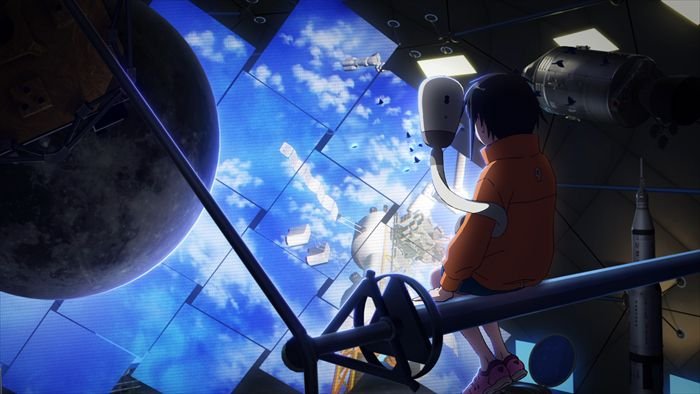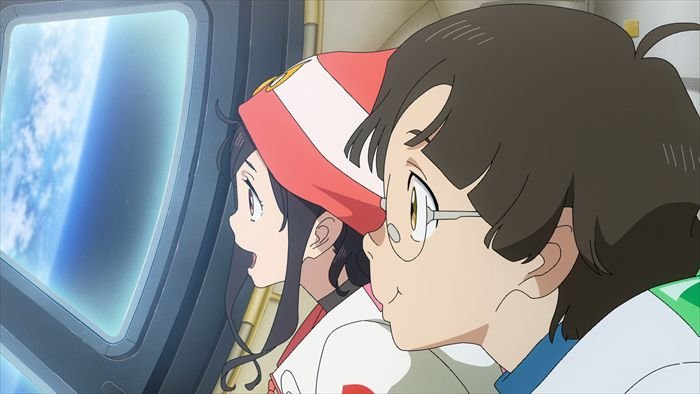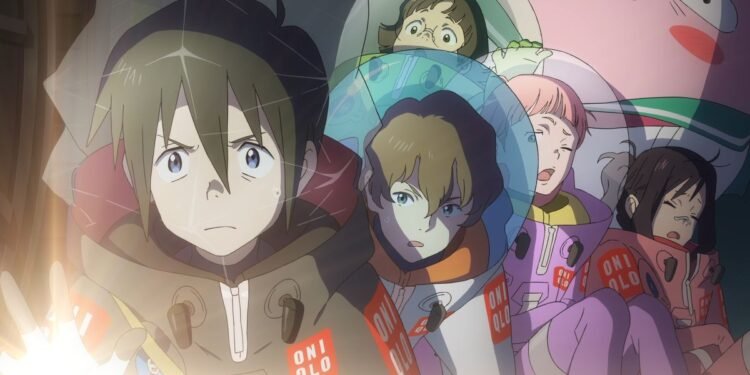Among casual anime fans, Mitsuo Iso may not be a name that leaps out with the same force of recognition as someone like Hayao Miyazaki, Hideaki Anno, or Shinichirō Watanabe. But you most certainly would recognize his work as an animator on such seminal anime series and films as FLCL, Ghost in the Shell, Neon Genesis Evangelion, RahXephon (where he made his debut as an episode director), and Blood the Last Vampire. His resume includes some of the most forward-thinking and technologically interesting anime of mid-’90s to early aughts, qualities which would go on to influence his critically acclaimed (yet criminally underseen) 2007 anime Den-noh Coil. Nearly 15 years since his last original production, Iso has returned with The Orbital Children, a new six-part original anime series available to stream on Netflix – and it was absolutely worth the wait.
Iso’s latest centers on a group of five children in 2045 whose lives are brought together by a quirk of fate in the wake of a disaster. Touya, a taciturn 14-year-old hacker living aboard a commercial space station called the Anshin, is one of two of the last living children born off-Earth following a catastrophe that forced humanity to retreat from colonizing the stars. Along with Konoha, his terminally ill childhood friend, Touya has been born with an artificial implant in his brain that impairs his ability to safely continue living in space, further fueling his complicated resentment for humanity and Earth. Following the arrival of Mina, Hiroshi, and Taiyo; three Earth-born children visiting the Anshin, the station is caught in a collision with a shower of meteor debris. While working to find a way of escaping the station unharmed, the children inadvertently find themselves at the heart of an elaborate plot that threatens the very existence of humanity itself.
Like Den-noh Coil, The Orbital Children could be aptly summed up as a coming-of-age story set against the backdrop of speculative fiction. Both Iso’s cult classic and its long-awaited spiritual successor are intimately concerned with the intersection of adolescence and technology. But their stories are otherwise like night and day. Where Den-noh Coil was a 26-episode coming-of-age sci-fi drama about a close-knit group of children whose personal story played out along the intersection of the technologically surreal and the physical mundane, The Orbital Children is an existential tale of growing up writ large; not just of Touya and co., but of an entire generation of humans living on the cusp of interplanetary colonization.

Image: Netflix / Production +h
What begins at first as your typical sci-fi survival drama à la 2013’s Gravity gradually morphs into what can only be described as a disaster thriller meets quasi-transhumanist parable. Imagine if Ghost in the Shell, Mobile Suit Gundam: Char’s Counterattack, and Interstellar were smashed together inside a particle accelerator and you’ve got a fairly solid idea of what the final third of The Orbital Children looks like.
In the decade and a half since it premiered, Den-noh Coil has been hailed not only for its believable characters and impressive animation, but as an exemplary work of “design fiction” for its depiction of the many practical and commercial applications of AR technology. With The Orbital Children, Iso has essentially picked up the baton where he left it back in 2007 and runs a marathon with it twice-over, imagining a future where not only has smart glass technology exponentially evolved and been popularized, but so too has artificial intelligence, social media, and commercial space tourism. It still feels futuristic, but it’s a future that feels as intimately reflective of the concerns and anxieties of the present as Den-noh Coil did of the nascent enthusiasm for augmented reality tech back in the late aughts.
From these elements, Iso weaves together a fictional universe of technical complexity and depth through which to tell a story about a group of children — and, in essence, a generation of people — learning to how to grow and make healthy decisions in the interest of bettering not only their own lives but the whole of humanity. The design of the Anshin space station represents a synthesis of many clashing elements working in tandem (the exterior resembles a cross between a Bernal sphere and the bathhouse from Spirited Away; the interior looks like one of Mamoru Hosoda’s wildest internet-inspired imaginings), which feels like an appropriate encapsulation for the contest of ideologies that plays out within it. Alongside a struggle for survival, the rebellious Touya repeatedly butts heads with Taiyo, a straight-laced “white hat” hacker working for the United Nations, over everything from the role of humans in space to the perceived perils and benefits of uninhibited AI. It’s a series that demands and rewards its audience’s undivided attention, touching on a vast web of seemingly disparate ideas that eventually dovetail into a thoroughly engrossing and touching experience.

Image: Netflix / Production +h
That’s to say nothing of the quality of the animation itself. As briefly mentioned, Iso is considered by many to be an “animator’s animator;” one of several artists to emerge during the early ’90s to earn recognition and effusive praise for his photorealistic approach to animation. If you’ve ever marveled at the explosive tank fight at the end of Ghost in the Shell or Asuka’s desperate final stand in End of Evangelion; you know Iso’s work.
While The Orbital Children may not reach the same rarified status in the canon of anime as those aforementioned classics, it’s an ambitious and beautiful series that certainly grazes at that greatness on the strength of the staff involved. Thanks to a team of collaborators including Iso’s longtime colleague Toshiyuki Inoue (Akira, Venus Wars) and talented key animators like Bahi JD (Ping Pong) and Vercreek (Jujutsu Kaisen, Deca-Dence), The Orbital Children’s animation is impressive for its imaginative (and frequently hilarious) rendering of Zero-G movement, its mind-bending shifts in point of view perspective, and a host of subtle idiosyncratic quirks that go a long way in creating believable portrayals of children acting like children amid tremendous circumstances.
With over a decade in the making, Iso has crafted an accomplished follow-up to Den-noh Coil with The Orbital Children, revisiting his penchant for dense speculative world-building through the eyes of a new generation confronted with new challenges, opportunities, and questions both personal and existential. It’s a triumph of imagination and craft, one which confidently asserts itself as one of the best anime to come out this year and further proof of Iso’s estimable yet understated brilliance.
All six episodes of The Orbital Children are available to stream now on Netflix.
























































